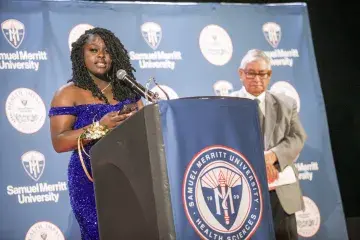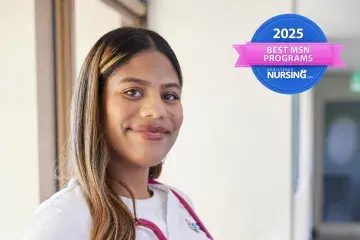After the Inferno: How a Family of Nurses is Helping Paradise Recover From California’s Deadliest Wildfire
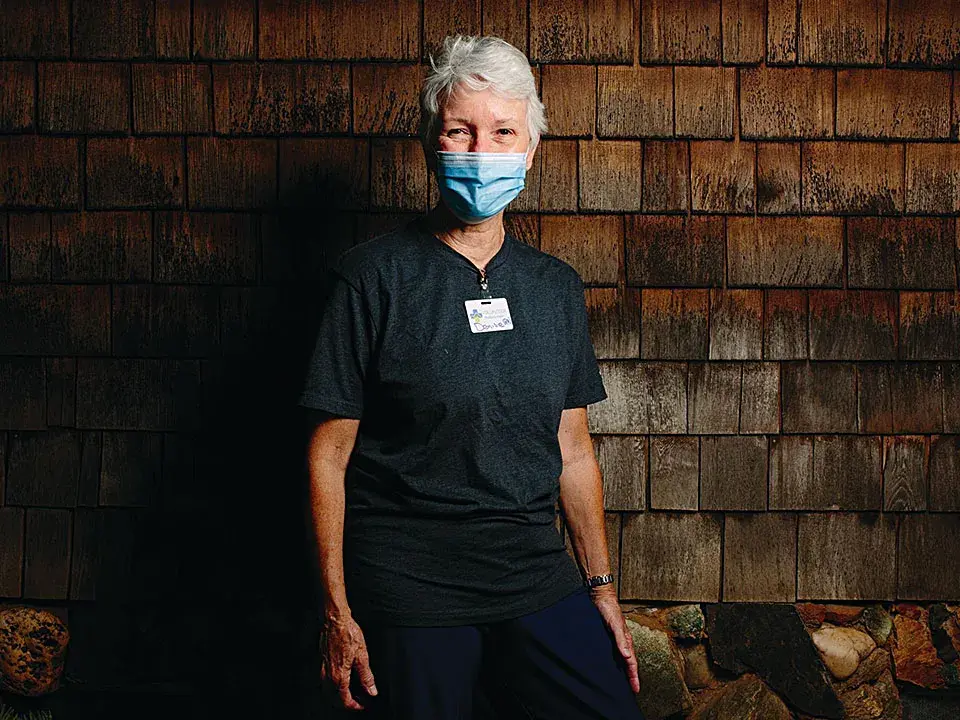
It’s a blistering Saturday afternoon in late July, half past 10 in the morning and temps headed to 90 on this wide volcanic ridge in the Sierra foothills. In the gravel lot behind Magalia Community Church, cars line up for the food bank. Across the parking lot, a crew from Medspire Health has set up a canopy for a mobile medical clinic. Larry and Pamela Pinson, a couple in their 60s, drove up early, making the 90-mile haul from Redding to see a medical team they trust.
The team includes Samuel Merritt University alumna Denise Gundersen, RN ’79, who founded Medspire along with her daughters—nurse practitioner Elisabeth Tove Gundersen and ER nurse Birgitte Randall—plus a cohort of EMTs, doctors, and mental health counselors. They first provided care to the Pinsons when the couple fled their home in Paradise after the Camp Fire swept across the Ridge, a close-knit community about 2,500 feet above Butte Valley that includes Paradise and a handful of small towns and villages, in November 2018, burning 19,000 structures and taking 85 lives.
During the COVID-19 pandemic, the Pinsons have steered clear of doctors’ offices. Instead, waiting for Medspire’s outdoor mobile clinic to reopen with new social distancing and safety protocols. Prescriptions need to be filled, vitals checked, lab tests ordered. Larry had a heart attack in 2012 and has a defibrillator. Pamela is diabetic; when she came to the clinic in January, she was out of meds.
Denise remembers their first visit, “Her sugars were out of control. We had some medications donated by Direct Relief, so we gave her some.” Then came COVID. “In April, Larry called again and said, ‘We’re about to run out, and there’s no way we’re going to the doctor. We’re scared.’” Again, Medspire was there for them.
Chip Bantewski is the next patient to arrive—shuffling as he pushes his wheelchair ahead of him, the seat bearing a paperback Tom Clancy. He has long white hair and a beard, something like an exhausted Santa Claus.
“Hey Chip! How are you?” Denise says.
Paramedic Steve Caput checks Chip’s pulse. “One-twenty. That’s a little high, Chip.”
“It’ll settle down in a moment or two,” Chip says.
Within a few minutes, fellow paramedic Sean Biswurm is examining and cleaning some chapped and bloody skin on the back of Chip’s calf. They review Chip’s medications; he’d like help wrangling timing for refills to get them all at once: heart meds, pain meds, and the medication that, as Chip puts it, “masks the B.S.” that he’s going through.
As for his leg: “I run so much in my sleep,” Chip says. “And I rub them together.”
“Why are you running in your sleep, Chip?” Biswurm asks.
“Sheww …” Chip exhales. “The girls are chasing me! If I slow down, I’ll have to deal with that!”
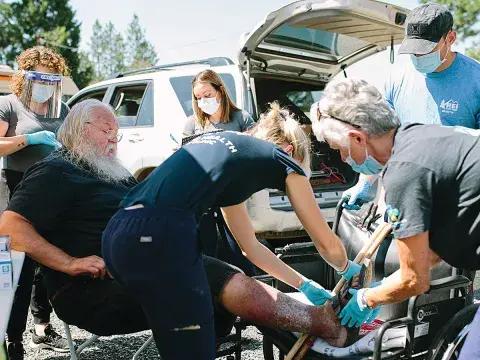
The towns on fire
Denise has lived on the Ridge for 30 years, raised her kids there. For two decades she was a nurse at Feather River Hospital in Paradise. “I loved every minute of it,” she says.
A few things you notice right off with Denise: a kindness and a gentleness and sense of comfort—everything is going to be OK. She has short, grayish-white hair and sparkling eyes. She speaks with almost a sing-song quality.
She comes from a family of caregivers. Her mom was a nurse, and Denise grew up hearing stories of her training in Denmark and work in Norway. Later, she moved to Norway and married a physician. When their daughter, Elisabeth, was small, “her father would often take her to work, let her play with the instruments, and have her chat with his patients.” Daughter Birgitte learned caregiving by helping her grandfather, who had MS. “She only ever saw him in a wheelchair,” Denise notes. “Even as a little girl she would help him dress, assist him with eating.”
When Denise studied at SMU, there were fewer than 40 students in her program. “About half of us lived in Bechtel Hall (a residence hall that no longer exists), with instructors’ offices and classrooms on the first floor,” she recalls. And that nurtured a tight-knit community. “We all had to support each other to complete a rigorous RN program. We all graduated as extremely well-prepared nurses.”
Denise was working at the hospital, as charge nurse in the surgical unit—up until the day the Camp Fire destroyed the community of Concow, leapt the Feather River and burned down Paradise, Butte Creek Canyon, and half of Magalia.
On Nov. 8, 2018, the morning the fire started, Denise was at home in Magalia—a town of about 11,000 just up the road from Paradise. Smoke blackened the sky to night and roaring winds carried embers a mile ahead of the main front, starting spot fires. “The fire stopped a mile from my house,” Denise says. “I don’t know why.” She looks away. “I lost the job I really loved, working in a small rural hospital. My patients were the kids of people I knew or teachers or the guy at the feed store, my grocery lady, my nursery lady.”
The fire nearly killed her daughter Birgitte. She and husband, Lonnie, lived in Paradise. An ER nurse at Feather River Hospital, Birgitte finished a night shift, and went home to bed, but couldn’t sleep. Checked her work email: code black at the hospital. Out on her back deck, she heard neighbors’ propane tanks exploding. She grabbed the dogs and called her husband to say she was leaving. Lonnie, a nurse at Oroville Hospital and a military vet, was half an hour away. He said he was coming home.
“The town’s on fire,” she told him. Into her Corolla and up Edgewood to Pearson, a crossroads to one of the routes off the Ridge. Traffic was bumper-to-bumper, fire raining from the sky. “I was like, ‘Well, shit, this is really bad.’ And my husband drives past me going back to our house! I thought, ‘OK, that’s it. This is how Lonnie dies.’”
Lonnie got to the house, grabbed his guns, hopped back in his truck. Was heading up Edgewood in thick traffic when he saw a pine tree ahead explode in flame. He knew that if he stayed in the truck he wouldn’t make it. He got out and ran. In the dark, he heard a woman shouting his wife’s name, “Birgitte! Birgitte!” Searching. Choking. Smoke everywhere. He somehow found his wife’s car. All three of them—the friend shouting Birgitte’s name, too—jumped in the Corolla with the dogs and made their way through apocalyptic fire. Normally a 30-minute haul to Chico, it took them five hours. Later, their fears were confirmed: their house, everything gone.
40,000 had to flee
Like many who live on the Ridge, Denise had an evacuation plan. She grabbed her emergency kit and headed for Chico, taking a narrow dirt logging road to get out. Elisabeth drove up from San Francisco.
There they were: three nurses with needed skills, nearly 40,000 people having fled homes. They called around asking where they could help. Answer: East Avenue Baptist Church, now an informal evacuation shelter for more than 250 medically vulnerable and elderly people.
Denise, her daughters, and a few nurses who joined them started in on triage. “Any immediate needs,” Denise says, “burns, anybody having chest pain, anyone in distress. Then we started writing down medications the evacuees needed.”
They put out a call for help on social media. The next day, there were doctors and physician assistants, respiratory therapists, and EMTs.
“About 50 people,” Denise says.
They clocked 18-hour days. With help, they dialed back to more survivable shifts. But their work for the community went on for weeks—three, four, six. Medical care and calling in prescriptions. Finding clothes and basic necessities. Helping to find temporary emergency housing for evacuees; they made, literally, hundreds of phone calls.
The Camp Fire burned for three weeks, until the end of November, when the rains came. Some houses on the Ridge were spared. But for those who remained, medical care was now scarce. Feather River Hospital was closed; there was no ER, no urgent care, no primary care. “We probably need to start a mobile clinic,” Denise proposed.
They held their first mobile clinic in March 2019 at Magalia Pines Baptist Church. And there, the idea of Medspire Health took form: based on the idea that healthcare is a right, it should be free, easily accessible, and the clinic should serve people most in need. Soon, they registered as a nonprofit. Denise became director of supplies and coordination.
For a year, Medspire hosted monthly clinics—setting up at different locations and seeing dozens of patients at a go, now upward of 400. They have provided wellness screenings, blood sugar and blood pressure checks, wound care, flu vaccinations, help with health insurance and mental health counseling, and referrals to primary care doctors and social services. They set up a 24-hour phone line at the outset of the COVID-19 pandemic to ensure that patients with chronic conditions or who were afraid to leave their homes could still access care.
Medspire goes to them
In the wake of the Camp Fire, FEMA and the Red Cross came and went. Medspire stayed. After all, this is their home.
“When I lived in Bechtel Hall, in the common room there were pictures of graduating classes going back to the first one in the early part of the last century,” Denise says. “All those nurses from Merritt going all around the world, serving in way too many wars, doing amazing work, caring for people for more than 100 years was very inspiring to me as a student nurse.”
Also inspiring: her first-year nursing instructor, Lillian Champagne. She was a retired colonel in the U.S. Army Nursing Corps and served overseas in Korea. “She was as tough as they came,” Denise says. “‘Don’t ever assume anything about the patient you are caring for,’ she would tell us. ‘Use your brain and all your senses to understand them, get under their skin.’ Perhaps an odd comment, but I understood exactly what she meant. It served me well in my career.”
With Medspire, she sees the same spirit in the volunteers: a core group of 11, plus five providers—nurse practitioners, doctors, and physician assistants—some 10 nursing students, three paramedics, as well as a small IT team.
Today, the population of the Ridge is a fraction of what it was. Some make do in trailers or motor homes, parked on empty property or parking lots. Some wound up in encampments without electricity or running water, in no way plugged into the healthcare system. PTSD, from the trauma of the fire, along with anxiety, depression, and addiction are among the diseases that go unmanaged. Those most in need might not come to a clinic. So, Medspire has begun to go to them. It’s part of the evolution of their mission.
“They go in and develop relationships in areas that were underserved before the fire, and even more so after,” says Glenna Eady, a nurse and case manager with Adventist Health in Paradise who has assisted at Medspire clinics and works with patients that Medspire steers her way. “They have advocated for people who were not advocating for themselves. It has created a bond that has made a difference. Medspire really is an inspiration.”
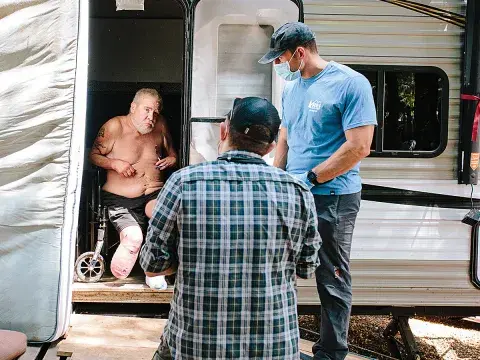
Everything I could have wanted
When COVID-19 hit, Medspire pivoted to telemedicine and phone consultations. The July clinic was the first in-person clinic since February. Dr. Ted Muller, Medspire’s medical director and a Feather River Hospital physician before it closed, arrives a bit late; his ER shift in Auburn, California wrapped up at 2:30 a.m.
At midday, while Denise and most of the others carry on work for the clinic in the parking lot, Muller joins a caravan to an RV camp on Dogtown Road, EMT Sean Biswan leading the way in his truck. This is new territory. They park by the entrance, venture in on foot. Among the RVs and battered cars are a couple of loose dogs, angrily announcing the arrival of strangers.
“I’m Dr. Muller, I’m with Medspire Health!” Muller calls out. “I’m just checking on people, seeing how people are doing. We’re a free medical clinic. We’re here to provide free medical care.”
That brings out a rangy-looking fellow who wants to know their story, and who puts away those dogs. He says to call him Ducky. His brother owns the place. Call it the Compound. He’s happy to bring the doctor and others in, see if they can find anyone who needs care. But not many are around; there’s a funeral for one of the residents today.
Ducky leads through paths lined with battered motor homes and engine parts and a couple of cabins, past an ochre-colored 1970 Mercury Comet on blocks. In a Jay Flight trailer, there’s a just-arrived resident named Ted Krieger who goes by Flipper. He’s shirtless and white bearded and in a wheelchair in his trailer, one leg amputated at the knee, the other foot amputated halfway. First thing Flipper asks the team is: “Do you do counseling, too?” They do; and introduce him to Ellie McMann, one of the mental health workers on the team.
Meanwhile, Muller and the EMTs peel off Flipper’s sock and unwrap some dirty bandages on his foot while Katie Rosauer, who worked as a medical scribe at Feather River Hospital and recently applied to SMU’s Physician Assistant program, takes notes. Flipper is alarmed when the doctor tells him there are maggots in the wound. The good news: The wound doesn’t appear to be infected, and maggots only eat dead flesh. Muller and the EMTs clean the wound, wrap fresh bandages, ask Flipper if he has any fresh socks. Maybe not.
They help an asthmatic woman who needs inhalers. Then see a man who lives in one of the cabins about a chronic foot problem. Before the Medspire crew is done, they hand out care packs—bags filled with vitamins and Emergen-C packets, granola bars and shampoo and hand soap. Rosauer thanks Ducky for letting them come in and showing them around. They promise to be back.
As Rosauer says, the hardest part is reaching out to people: finding them and gaining their confidence. “A lot of the people that we would love to help are ones that don’t trust the system. At Medspire, we work to bridge the gap between these individuals who have fallen through the cracks and connect them to the healthcare they deserve.”
Fire returned to California this year. By September, it was already the worst fire season in recorded history. This time Paradise and Magalia were spared. Two years after the Camp Fire, there are three primary care and urgent care facilities but still no ER and no hospital.
Along with the work she does through Medspire, Denise is part of other efforts to try to revive the community on the Ridge. She takes heart from the fact that several hundred building permits have been pulled in Paradise; scores of houses are being built. She is working on an indoor location for the clinic for when the weather turns in autumn: the former clubhouse of Paradise Pines Golf Course, now closed. Denise is also part of efforts to purchase or lease the surrounding land. They hope to make it into a community park.
This has also been a year of personal loss: In February, her mother died, at age 93—at home, quietly. “That’s what we all want, right?” Denise says.
But also, one of hope. She’s a new grandmother. Before the fire, Birgitte and Lonnie were planning to start a family. That went on hold for a spell. But by July, when Medspire held its first medical clinic in months, the couple are expecting their first. On Nov. 2, the couple celebrated the birth of 7-pound 6-ounce Katherine Elisabeth Randall.
“Wouldn’t it be wonderful if my grandchild chooses a nursing or medical career? Nursing has given me everything I could have ever wanted—personally and professionally. I’d be her biggest cheerleader!”
